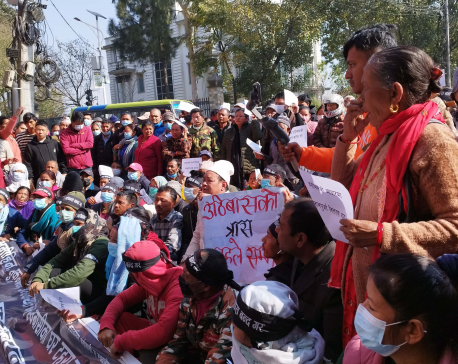
OR
SC tells government not to distribute forest area to landless squatters
Published On: May 20, 2024 10:45 AM NPT By: Bhasa Sharma

KATHMANDU, May 20: The Supreme Court (SC) has issued a mandamus order in the name of the government to explore other alternatives for managing landless squatters without resorting to clearing forests. The SC has urged the government to look for an alternative without solely relying on forest land to address the growing issue of landless squatters.
The full text of the judgment delivered by the constitutional bench comprising Chief Justice Bishwombhar Prasad Shrestha, justices Ishwar Prasad Khatiwada, Ananda Mohan Bhattarai, Sapana Pradhan Malla and Prakash Kumar Dhungana was released on Friday.
The SC stated that instead of relying on the option of allocating land in the forest area to solve the problem of landless squatters, other alternative measures should be adopted. “The act of settling landless squatters on forest land without exploring alternatives can never be considered appropriate," reads the judgment of the SC.
Bypassing the legal process related to the implementation of the Forests Act, 2076 BS and the National Parks and Wildlife Conservation Act, 2029 BS, without the official and formal decision of the body established by the Act undermines the conservation efforts," said the SC. “A mandate is issued not to distribute or cause to distribute land to landless squatters or unorganized settlers in a manner that legitimizes encroachment of forests and protected areas,” the judgment further reads.
The SC has elaborately explained the issue of the effects of forest destruction on the natural water cycle and the overall environment. The judgment explains the cyclical nature of the environment and analyzes the options for solving the problems related to landless squatters in connection to forests.
It is mentioned that forest land should not be distributed in the name of landless squatters as the risk of drought will increase and air pollution will increase and affect human health. Explaining the importance of forests and the adverse effects on the environment, the Supreme Court emphasized on protecting forests. The text reads that forest encroachment will disrupt the natural habitat of wildlife, leading to increased animal incursions into human settlements.
The SC has said that risks such as floods, landslides, water scarcity, air pollution, soil erosion, and animal attacks will result from forest encroachment. "To address the issue of landless squatters, it is necessary to search for a long-term solution, prioritizing both the human and environmental aspects, instead of clearing the forest and making people live there," reads the judgment.
The SC has also explained the right to a clean environment as a fundamental right enshrined in the constitution. Article 30 of the Constitution recognizes the right to a clean environment as a fundamental right. The judgment has connected a clean environment with forest.
"The problem of landless squatters is one of the many problems in the country. While choosing a solution to this problem, one should also be aware of other additional problems that it may cause,” said the verdict. "If we rely on forest land to solve the problems of landless squatters, the problems created by it cannot be ignored. When squatters or unorganized settlers reside illegally in the forest area with or without the permission of the government, the forest is destroyed due to their activities such as housing, agriculture, grazing of livestock,” the verdict further states.
“This causes long-term problems such as imbalance in the ecosystem, loss of biological diversity, floods, water scarcity, air pollution, soil erosion. Not only because of the environmental risk, but also the constitutional provisions of Nepal, international commitments and existing laws related to forests and national parks do not recognize the settlements established by encroaching forest areas,” the verdict further reads.
There is no provision for distributing forest land to landless squatters or unorganized settlers.
The SC has stated that the government cannot act for the benefit of a few individuals or communities without considering the welfare of the entire population.
The SC has already set a precedent in a similar case. In the writ petition filed by Nanda Keshar Rai and others against the Government of Nepal, including the Prime Minister and Council of Ministers Office, for registering forest areas in the name of landless squatters, the SC decided that public land in forest areas cannot be registered in the name of specific individuals. Based on the precedents set earlier, the SC's view is that constructing roads randomly, excavating, and registering land in forests and protected areas in the name of landless squatters is not permissible.
Moreover, the Forests Act of 2076 BS and the National Parks and Wildlife Conservation Act of 2029 BS expressly prohibit habitation in forested, park, and protected areas.
You May Like This

KMG Chairman Sirohiya approaches SC seeking an order to prevent his arrest
KATHMANDU, May 21: Kailash Sirohiya, chairman of Kantipur Media Group, has approached the Supreme Court upon learning that an arrest... Read More...

Landless squatters protest outside KMC office
KATHMANDU, Nov 29: The slum-dwellers and landless squatters organized a protest outside Kathmandu Metropolitan City (KMC) office, Sundhara, Kathmandu, on... Read More...

No alternative to change party leadership: NC leader Singh
NEPALGUNJ, March 28: Nepali Congress (NC) leader Prakashman Singh has ruled out the possibility of stronger NC if it continues... Read More...






Just In
- Challenges Confronting the New Coalition
- NRB introduces cautiously flexible measures to address ongoing slowdown in various economic sectors
- Forced Covid-19 cremations: is it too late for redemption?
- NRB to provide collateral-free loans to foreign employment seekers
- NEB to publish Grade 12 results next week
- Body handover begins; Relatives remain dissatisfied with insurance, compensation amount
- NC defers its plan to join Koshi govt
- NRB to review microfinance loan interest rate











Leave A Comment